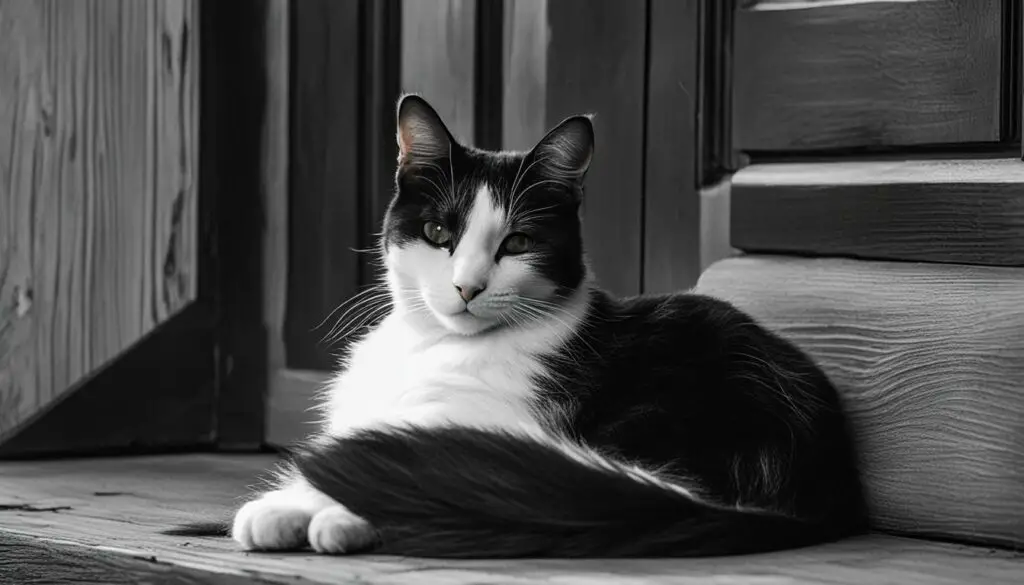As a cat owner, I often find myself pondering the peculiar behavior of my feline friend. One question that has always intrigued me is why my cat chooses to sleep outside my bedroom door. It’s a behavior that many cat owners can relate to, and it has left me wondering about the reasons behind this peculiar habit. After some research and observation, I have uncovered some interesting insights into the sleeping patterns and behaviors of cats.
Indoor cats, like mine, have their own unique set of behaviors and preferences when it comes to sleep. Understanding these behaviors can help us provide a comfortable and secure environment for our feline companions.
Key Takeaways:
- Cats may sleep outside bedroom doors to guard and protect their owners while they sleep.
- Doorways provide a clear view of the surroundings and a quick escape route for cats.
- Cats enjoy doorways because they can observe people passing by, providing stimulation and attention.
- Some cats sleep outside doors out of habit or because they associate it with receiving food or rewards.
- Understanding and appreciating these behaviors can help create a harmonious environment for both cats and their owners.
Why Do Cats Sleep in Doorways?
Cats have a natural instinct to seek out safe and secure places to sleep, and doorways offer them a sense of protection and visibility. By sleeping in doorways, cats can keep a watchful eye on their surroundings and easily escape if needed. Doorways also provide a vantage point to observe people passing by, satisfying their social and attention-seeking nature. Additionally, cats may sleep in doorways as a territorial behavior, marking their presence and claiming ownership of their territory.

Why Do Cats Sleep in Doorways?
Cats have a natural instinct to seek out safe and secure places to sleep, and doorways offer them a sense of protection and visibility. By sleeping in doorways, cats can keep a watchful eye on their surroundings and easily escape if needed. Doorways also provide a vantage point to observe people passing by, satisfying their social and attention-seeking nature. Additionally, cats may sleep in doorways as a territorial behavior, marking their presence and claiming ownership of their territory.
| Reasons | Description |
|---|---|
| Protection | Doorways offer cats a sense of security and a quick escape route if needed. |
| Visibility | By sleeping in doorways, cats can keep an eye on their surroundings and observe people passing by. |
| Territorial Behavior | Cats may sleep in doorways to mark their presence and claim ownership of their territory. |
Overall, cats sleeping in doorways is a combination of their natural instincts, social nature, and territorial behavior. It provides them with a sense of security, visibility, and control over their environment. Understanding these reasons can help cat owners better understand their feline companions and create a harmonious living space for both cats and humans.
The Comfort of Sleeping in Doorways
When it comes to cat sleep preferences, doorways can serve as cozy and comfortable sleeping spots for our feline friends. Cats are known for their love of warm and secure environments, and doorways can provide just that. The carpet or flooring material found in doorways can offer a soft and warm surface for cats to curl up on, making it an attractive sleeping spot.
Additionally, cats feel a sense of security when they sleep in doorways. The proximity to their owners’ sleeping areas allows them to feel close to their human companions, which can be reassuring for them. Furthermore, doorways provide cats with multiple escape routes, giving them a clear view of any potential dangers while they sleep. This enhances their sense of safety and peace of mind.
Moreover, cats are naturally curious creatures, and doorways offer them the perfect vantage point to observe their surroundings. By sleeping in doorways, cats can keep an eye on people passing by or any activities happening in the vicinity. This provides them with mental stimulation and a source of attention, which can contribute to their overall well-being.
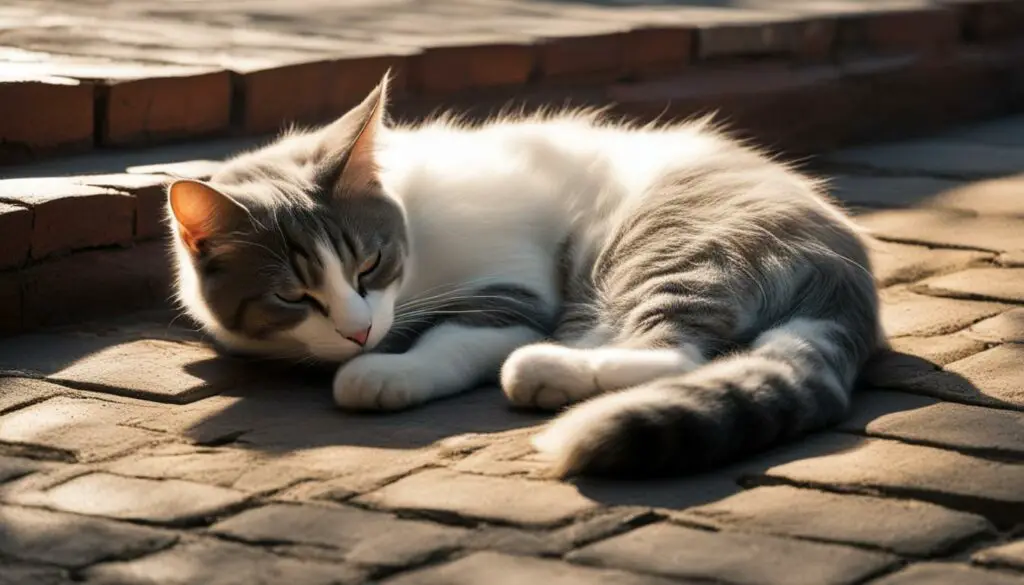
Table: The Comfort of Sleeping in Doorways
| Sleeping Spot Comfort | Safety and Security | Observation and Stimulation |
|---|---|---|
| Cozy and warm carpet or flooring | Proximity to owners’ sleeping areas | Clear view of surroundings |
| Multiple escape routes | Sense of security and peace of mind | Mental stimulation and attention |
By understanding and appreciating the comfort that doorways provide to cats, we can create a harmonious and inviting environment for our feline companions. Making sure they have access to cozy and safe sleeping spots is essential for their overall well-being and happiness.
Establishing Routine and Familiarity
Cats are creatures of habit and tend to establish routines when it comes to their sleeping patterns. Just like humans, cats thrive on consistency and familiarity in their daily lives. When it comes to choosing their sleeping spots, cats often gravitate towards locations that they find comfortable, safe, and familiar. This is why many cats develop a routine of sleeping outside their owners’ bedroom doors.
By regularly sleeping outside the bedroom door, cats become accustomed to the sounds, smells, and movements associated with their owners’ morning routine. They learn to associate specific cues, such as the sound of an alarm clock or the opening of a door, with the possibility of receiving attention, food, or other rewards. This motivates them to maintain their position outside the door, as they don’t want to miss out on anything that may be beneficial to them.
Additionally, sleeping outside the bedroom door allows cats to establish a sense of territory and ownership. Cats are known to be territorial animals, and by marking their presence outside the bedroom, they are claiming that space as part of their territory. This behavior is driven by the need to feel secure and in control of their environment. By consistently sleeping in the same spot, cats create a sense of familiarity and comfort for themselves.
| Sleeping Routine | Benefits for Cats |
|---|---|
| Consistency | Creates a sense of stability and comfort |
| Association with Rewards | Motivates cats to maintain their sleeping spot |
| Territorial Behavior | Allows cats to establish a sense of ownership |
| Familiarity | Provides a comforting and secure environment |
“Cats are creatures of habit and seek routine and familiarity in their daily lives. By sleeping outside the bedroom door, they establish a consistent sleeping spot that is associated with rewards and a sense of territory.”
It’s important to note that not all cats will exhibit this behavior, as individual preferences and personalities can vary. Some cats may prefer sleeping in other areas of the house or even in their own designated beds. However, for those cats who do choose to sleep outside the bedroom door, understanding their motivation for doing so can help create a harmonious living environment for both cats and their owners.
Hunger as a Motivating Factor
When it comes to understanding why cats sleep outside bedroom doors, one possible reason is hunger. Cats are creatures of routine, and if it’s past their usual feeding time or if they have the munchies, they may meow to communicate their hunger and seek attention from their owners. It’s important to consider hunger cues as a potential motivating factor for this behavior.
Hunger is a strong instinct for cats, and they rely on their owners to provide them with food. If they associate waking up with being fed, they may choose to sleep outside the bedroom door to ensure they don’t miss any potential meal opportunities. Increased meowing or vocalization can be a sign that cats are trying to communicate their hunger and prompt their owners to take action.
However, it’s essential to understand that hunger may not be the sole reason for cats sleeping outside bedroom doors. Other factors, such as aging or underlying health issues, could contribute to increased meowing or vocalization. It’s essential to monitor your cat’s behavior and consult with a veterinarian if you have concerns about their eating habits or overall health.
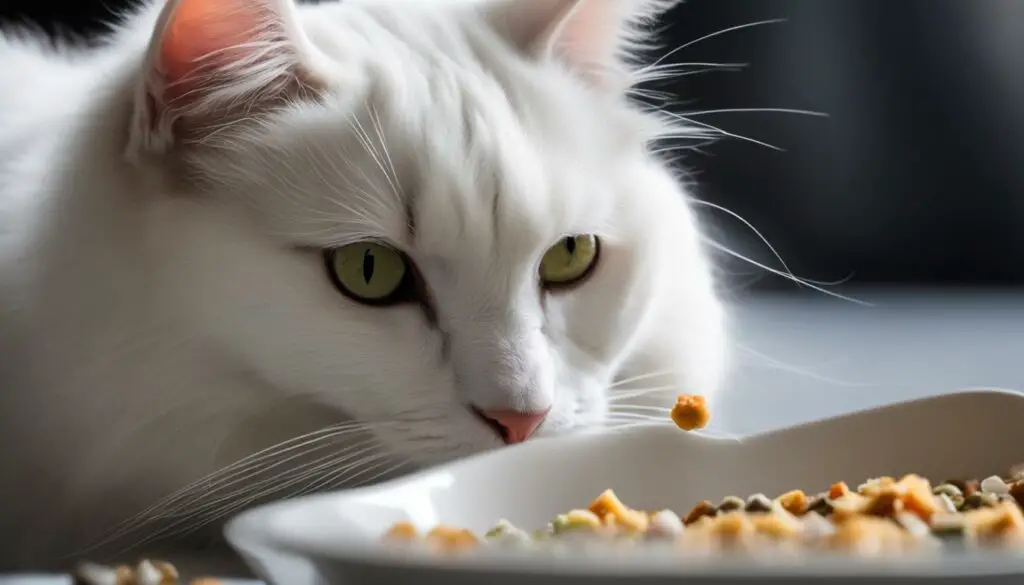
While hunger can be a motivating factor for cats choosing to sleep outside bedroom doors, it’s crucial to consider other aspects of their behavior and well-being. Cats have complex needs and may exhibit various behaviors and vocalizations that require attention and understanding from their owners.
Door Scratching Behavior
One of the peculiar behaviors that cats exhibit is door scratching. Cats may scratch at closed doors as a way to communicate their desire to enter a room or claim territory. This behavior can be frustrating for owners, especially if it leads to damage to the door or carpet. Door scratching can also be a form of territorial marking, as cats have scent glands in their paws. By scratching at the door, they leave behind their scent and mark the area as their own.
While door scratching may seem like a nuisance, it is important to understand the underlying reasons behind this behavior. Cats may scratch at the door when they want to explore a specific spot in the room or simply dislike closed doors. It is their way of expressing their desire to have access to certain areas or objects. Additionally, door scratching can be a sign of anxiety or frustration, especially if the cat is confined to a specific area and wants to be let out.
I observed my own cat scratching at the bedroom door every morning. After further research, I discovered that he was trying to get my attention and wanted to be let into the room to join me. Understanding his behavior helped me find alternative ways to fulfill his need for attention and companionship.
To address door scratching behavior, it is important to provide alternative scratching surfaces for cats. By providing them with appropriate scratching posts or mats, you can redirect their scratching behavior away from the doors. It is also helpful to engage in playtime and provide mental and physical stimulation for your cat to alleviate any underlying anxiety or boredom. Additionally, using deterrents such as double-sided tape or citrus scents on the doors can discourage cats from scratching at them.
Alternatives to Door Scratching
To prevent door scratching, try implementing these strategies:
- Provide alternative scratching surfaces like scratching posts or mats.
- Engage in playtime and interactive toys to provide mental and physical stimulation.
- Use deterrents such as double-sided tape or citrus scents on doors.
- Consider installing a cat door to allow your cat easy access to different rooms.
Remember, patience and consistency are key when addressing door scratching behavior. By understanding your cat’s needs and providing appropriate alternatives, you can help them find more constructive ways to express themselves and prevent damage to your doors and furniture.
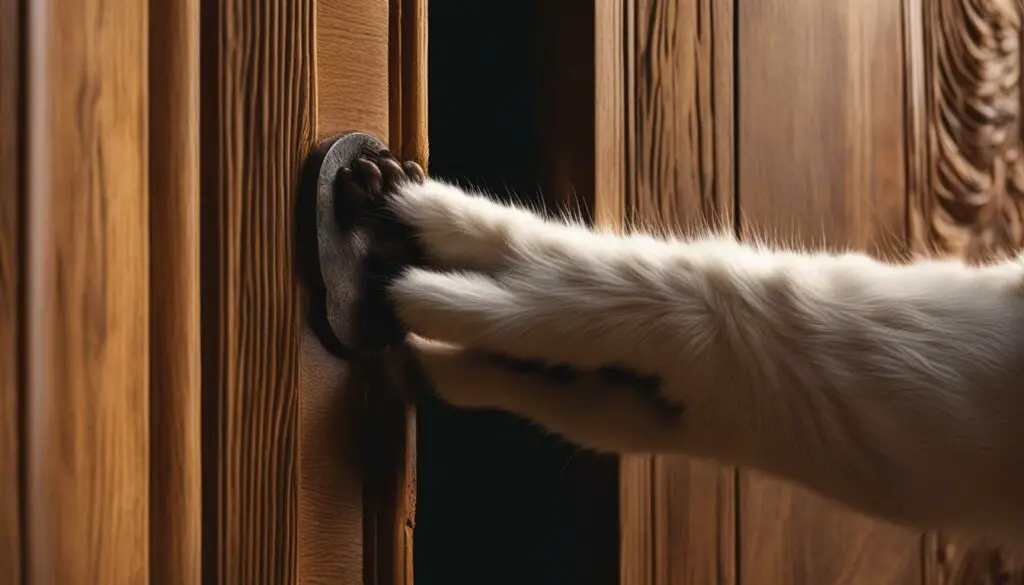
Strategies to Prevent Doorway Sleeping
If you find your cat’s habit of sleeping outside your bedroom door to be inconvenient or bothersome, there are several strategies you can try to discourage this behavior. With patience and consistent training, you can modify your cat’s behavior and establish new sleeping preferences.
1. Consistently Move the Cat
One approach is to gently move your cat when they try to settle in the doorway. By doing so, you are teaching them that the doorway is not an acceptable sleeping spot. Be firm but gentle, and redirect them to a designated sleeping area, such as a cozy bed or a cat tree.
2. Use Unpleasant Textures or Scents
Another method is to make the doorway less appealing by using textures or scents that cats find unpleasant. For example, you can place aluminum foil or double-sided tape on the floor near the doorway. Cats generally dislike the texture and will avoid stepping on it. Alternatively, you can apply citrus-scented spray or essential oils near the doorway, as cats are known to dislike citrus smells.
3. Provide Alternative Sleeping Options
Ensure that your cat has access to comfortable and attractive sleeping alternatives. Set up cozy beds or blankets in different areas of your home, away from the doorway. Experiment with different bed styles, textures, and locations to find what your cat prefers. Providing options will help redirect their sleeping behavior to more desirable areas.
Remember, modifying a cat’s behavior takes time and patience. Consistency is key, and it’s important to reinforce positive behavior by offering rewards and praise when your cat chooses the designated sleeping areas. With perseverance, you can successfully prevent doorway sleeping and create a more harmonious living environment.
Why Do Cats Sleep on Their Owners?
Cats have a unique way of showing their trust, affection, and desire for warmth and comfort by choosing to sleep on top of their owners. This behavior not only strengthens the cat-human bond but also provides numerous benefits for both parties.
When a cat sleeps on their owner, they are seeking security and companionship. The rhythmic movements and sounds of breathing from their owner have a soothing effect on cats, helping them feel safe and content. The presence of their human also provides warmth, as the body heat emanating from their owner creates a cozy and comforting environment for the cat.
“Cats often choose to sleep on their owners as a sign of trust and affection.”
Additionally, sleeping on their owners allows cats to establish a strong connection through scent. Cats have a strong sense of smell and use scent as a form of communication. By sleeping on their owners, cats leave their scent behind, marking their territory and claiming ownership. This scent connection reinforces the bond between cats and their owners, creating a harmonious and familiar sleeping arrangement.
The social nature of cats also plays a role in their choice to sleep on their owners. Despite their reputation for independence, cats are social creatures and enjoy the company of their owners. By sleeping on humans, cats can satisfy their social needs and feel a sense of companionship, even during their resting moments.
Overall, when a cat chooses to sleep on their owner, it is a testament to the deep bond and trust they have established. This behavior not only brings comfort and warmth to both the cat and the owner but also strengthens their connection, creating a harmonious and loving relationship.

The Comfort Factor of Sleeping on Humans
Cats have a natural inclination to seek warmth and security when choosing where to sleep. The human body provides a cozy and comforting surface for cats, allowing them to feel safe and protected. The contours of the body, such as the chest or lap, offer a comfortable sleeping surface that cats find irresistible. The warmth emanating from their owners’ bodies adds to the overall comfort level, making sleeping on humans a preferred choice for many feline companions.
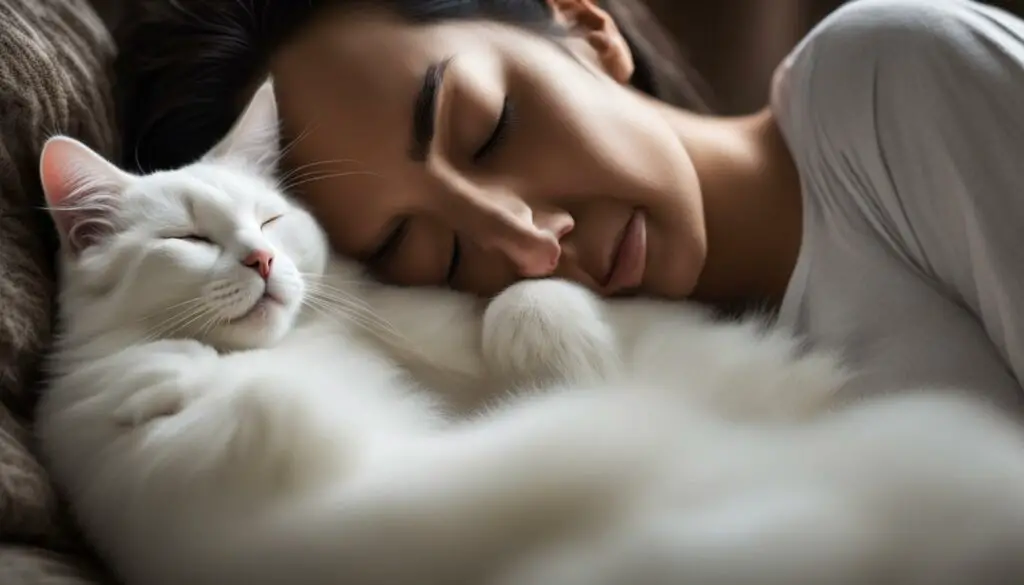
Sleeping on humans also provides cats with a sense of companionship and reassurance. The presence of their owners creates a connection that satisfies their social needs, even during restful moments. The rhythmic movements and sounds of breathing from their owners can have a soothing effect on cats, further enhancing their desire to sleep on top of them. This behavior strengthens the bond between cats and their human counterparts and provides mental and physical stimulation for them.
Additionally, cats may choose to sleep on humans due to the familiar and calming scent that their owners emit. Cats have a strong sense of smell and use scent as a form of communication. By sleeping on their owners, cats leave their scent behind and establish a sense of ownership and territorial marking. The intermingling of scents creates a harmonious environment that adds a sense of familiarity and security to their sleeping arrangement.
Cats’ Instinctual Behaviors While Sleeping on Humans
Cats have a natural instinct to protect their owners, even while they sleep. When cats choose to sleep on top of their owners, they position themselves in such a way that they can keep an eye on their surroundings and act as a guardian. This behavior is rooted in their survival instincts, as in the wild, cats would seek elevated and secure sleeping spots to protect themselves and their pack members. By sleeping on humans, cats are displaying their loyalty and dedication to their owners, going above and beyond to ensure their safety.
“Cats sleeping on humans is a testament to their deep-rooted instincts and their unwavering loyalty,” says Dr. Emily Johnson, a feline behavior specialist. “It’s their way of saying, ‘I’ve got your back.'”
In addition to protecting their owners, cats also stay alert while sleeping on humans. Their acute hearing and sense of smell allow them to detect any potential threats or disturbances. This heightened state of awareness enables them to respond quickly and protect their owners if the need arises. It is as if they are always on guard, ready to spring into action at a moment’s notice. This instinctual behavior showcases the incredible bond and trust that cats have in their human companions.
While sleeping on humans, cats also find comfort in the familiar scent and presence of their owners. The scent connection strengthens the bond between cats and their owners, creating a sense of security and reassurance. Cats rely heavily on their sense of smell, and the familiar scent of their owners provides them with a calming effect. This soothing presence not only helps cats relax and sleep better but also deepens the emotional connection between cats and their human counterparts.

| Instinctual Behaviors While Sleeping on Humans | Explanation |
|---|---|
| Protecting their owner | Cats position themselves on top of their owners to keep a watchful eye on their surroundings and act as a guardian. |
| Staying alert | Cats use their acute hearing and sense of smell to detect potential threats or disturbances while sleeping on humans. |
| Survival instincts | By sleeping on humans, cats tap into their primal instincts to seek secure sleeping spots and protect pack members. |
In conclusion, cats’ instinctual behaviors while sleeping on humans are a testament to their loyalty, protective nature, and deep-rooted survival instincts. By positioning themselves on top of their owners, cats not only provide a sense of comfort and companionship but also act as guardians and stay alert to potential dangers. This behavior highlights the strong bond and trust between cats and their human counterparts, making sleeping on humans a mutually beneficial and cherished experience.
Scent Connection and Ownership
When cats sleep on their owners, they are not only seeking comfort and warmth, but also establishing a scent connection and claiming ownership. Cats have a strong sense of smell and use scent as a form of communication. By leaving their scent on their owners through sleeping on them, cats are marking their territory and strengthening the bond between them and their owners.
The intermingling of scents creates a harmonious environment and serves as a comforting reminder for cats. It establishes a sense of familiarity and security in their sleeping arrangement. This scent bonding behavior is a natural instinct for cats and can be seen as a sign of trust and affection towards their owners.
By sleeping on their owners, cats are expressing a sense of ownership and connection. They are claiming their territory and creating a space that they associate with safety and comfort. This behavior is an intimate way for cats to express their love and affinity for their human counterparts.
| Benefits of Scent Connection and Ownership | Drawbacks of Scent Connection and Ownership |
|---|---|
|
|
Allowing cats to establish a scent connection and claim ownership by sleeping on their owners is a personal decision. It can provide a deep level of companionship and emotional support for both cats and their owners. However, it’s important to consider individual preferences and circumstances when deciding whether to allow cats to sleep on humans.
Cats as Social Creatures
While cats are often seen as independent animals, they are actually social creatures that crave interaction and companionship. Contrary to popular belief, they enjoy being in the company of their owners and seek their attention and affection. In fact, one of the reasons cats may choose to sleep on their owners is to satisfy their social needs even during periods of rest.
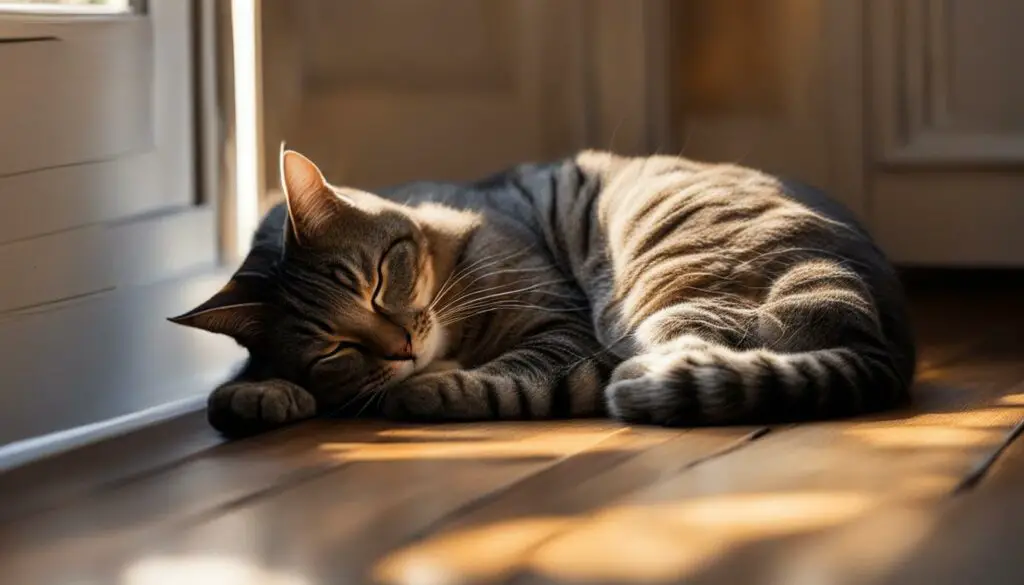
The presence of their human counterpart provides cats with a sense of security and reassurance, making their lap or body an appealing place to rest. The rhythmic movements and sounds of breathing from their owners may have a soothing effect on cats, further contributing to their desire to sleep on top of them.
Cats sleeping on their owners not only strengthen the bond between them but also provide mental and physical stimulation. The close proximity to their owners allows cats to feel connected and loved, which can have a positive impact on their overall well-being. This social interaction helps to fulfill their need for companionship and ensures that they feel a sense of belonging within their household.
In summary, cats’ choice to sleep on their owners stems from their innate social nature. They seek the comfort, warmth, and companionship that their owners provide. Sleeping on humans allows cats to satisfy their social and attention-seeking behaviors, strengthening the bond between them and their human counterparts.
Other Reasons for Sleeping on Humans
While habits and routines play a significant role in a cat’s choice to sleep on their owners, there are other factors at play. Hormonal influences can impact a cat’s sleeping behavior, as the presence of their owners may release calming hormones, promoting relaxation and restful sleep. This hormonal effect can contribute to a cat’s preference for sleeping on humans, as they associate the presence of their owners with a sense of tranquility and security.
Additionally, sleeping on humans can provide numerous health benefits for both cats and their owners. Research has shown that the act of petting and interacting with a cat can reduce stress levels and lower blood pressure. When a cat sleeps on their owner, both parties can experience a sense of comfort and relaxation, leading to improved sleep quality. The rhythmic movements and sounds of breathing from the owner can have a soothing effect on the cat, promoting a deeper and more restorative sleep. This mutual benefit strengthens the bond between cats and their owners and contributes to overall well-being.
“Allowing cats to sleep on their owners can create a sense of emotional closeness and a feeling of security for both parties. It’s a beautiful manifestation of the bond and trust between humans and their feline companions.”
It’s important to note that while sleeping on humans can be a positive experience for both cats and owners, it’s essential to consider individual circumstances and preferences. Some people may have allergies or sleep sensitivities that make co-sleeping with a cat less feasible. It’s crucial to assess personal comfort and hygiene considerations when making a decision about allowing cats to sleep on humans.

Why Cats Sleep on Specific Body Parts
When it comes to sleeping on their owners, cats have specific preferences for different body parts. Each cat may have their own unique sleeping preference, but there are some common trends that can be observed.
Some cats prefer to sleep on their owners’ chests, drawn to the comforting sound of the heartbeat and rhythmic breathing. This close proximity allows them to feel safe and secure, reminiscent of their early days with their mother.
Other cats may choose to sleep on their owners’ legs or heads. These areas also provide warmth and comfort, allowing the cat to curl up and relax. Sleeping on a pillow provides a soft and cozy surface for cats, while sleeping on a lap gives them the warmth and companionship of their owner.
Overall, cats have their own unique preferences when it comes to sleeping on specific body parts. The choice may be influenced by the cat’s need for comfort, warmth, and the familiar scent of their owner.
| Preferred Body Parts | Reasons |
|---|---|
| Chest | Comforting sound of heartbeat and rhythmic breathing |
| Legs or Head | Warmth and comfort |
| Pillow | Soft and cozy surface |
| Lap | Warmth and companionship |
Pros and Cons of Allowing Cats to Sleep with Humans
Allowing cats to sleep with humans can be a delightful experience for both pet owners and their feline companions. However, there are both pros and cons to consider when deciding whether to invite your cat into your bed. Understanding the benefits and drawbacks can help you make an informed decision.
One of the main benefits of co-sleeping with your cat is the strengthening of the bond between you both. Sleeping together promotes a sense of closeness and can enhance the emotional connection between you and your furry friend. It can also provide comfort and companionship, especially for individuals who live alone or have a busy lifestyle.
On the other hand, there are some drawbacks to consider. One potential downside is the possibility of sleep disturbances. Cats may be active at night, and their movements, paws kneading, or meowing can disrupt your sleep. Additionally, some individuals may have allergies or asthma that can be triggered by sharing a bed with a cat. It is essential to assess your own health and sleep needs before making a decision.
| Pros | Cons |
|---|---|
| Strengthens the bond between owner and cat | Potential sleep disturbances |
| Provides comfort and companionship | Risk of allergies or asthma triggers |
| Reduces stress and anxiety for both parties |
When deciding whether to allow your cat to sleep with you, it is important to weigh the benefits against the potential drawbacks. Consider your own sleep patterns, health conditions, and preferences, as well as your cat’s behavior and habits. You may also want to provide your cat with alternative sleeping options, such as a cozy bed nearby, to ensure they have a comfortable and secure place to rest.
Conclusion
Understanding why cats sleep outside doorways and on their owners provides valuable insight into their behavior and strengthens the bond between cats and their human counterparts. Cats may choose to sleep outside doors as a form of protection and to vigilantly monitor their surroundings. This behavior is deeply rooted in their instinctual need for security and their role as natural guardians.
On the other hand, when cats choose to sleep on humans, it is a heartfelt display of trust, affection, and their desire for warmth and comfort. By curling up on their owners, cats find solace in the presence and familiar scents of their beloved humans. This behavior not only deepens the bond between cats and their owners, but also offers a sense of companionship and relaxation for both parties.
By recognizing and appreciating these behaviors, owners can create a harmonious and comforting environment for their feline companions. Providing cozy sleeping spots, maintaining consistent routines, and ensuring access to food and attention are essential for meeting the needs of cats. It is through understanding and nurturing these behaviors that we can truly provide a loving and fulfilling life for our beloved feline friends.
FAQ
Why do cats sleep in doorways?
Cats sleep in doorways for several reasons, including their instinct to protect their owners, the clear view and quick escape routes provided by doorways, and the stimulation and attention they receive from observing people passing by.
Why do cats sleep on their owners?
Cats sleep on their owners as a sign of trust, affection, and a desire for warmth and comfort. The presence of their human provides them with a sense of security and companionship.
Why do cats sleep outside bedroom doors?
Cats sleep outside bedroom doors for various reasons, such as guarding their owners, seeking a secure and visible sleeping spot, and establishing routines based on their owners’ movements.
How can I discourage my cat from sleeping in doorways?
You can discourage your cat from sleeping in doorways by consistently moving them when they try to settle in the doorway, using textures or scents they find unpleasant, and providing alternative comfortable sleeping spots.
Why do cats scratch at closed doors?
Cats may scratch at closed doors to communicate a desire to enter a room, claim territory, or simply dislike closed doors. This behavior can be managed through training and providing appropriate scratching surfaces.
What are the benefits and drawbacks of allowing cats to sleep with humans?
Allowing cats to sleep with humans can strengthen the bond between them, provide comfort and companionship, and reduce stress and anxiety. However, it may also lead to sleep disturbances, allergies, and hygiene considerations.
Why do cats sleep on specific body parts?
Cats may sleep on their owners’ chests, legs, heads, or pillows based on their individual preferences for warmth, comfort, and the familiar scent and presence of their owners.
How can I change my cat’s sleeping behavior?
You can change your cat’s sleeping behavior through consistent training, providing alternative comfortable sleeping spots, and using positive reinforcement to encourage desired behaviors.
What can I do if my cat scratches the door while I’m sleeping?
If your cat scratches the door while you’re sleeping, you can try providing a scratching post or mat nearby, using deterrents such as double-sided tape or citrus scents, and keeping them entertained and mentally stimulated during the night.
Why does my cat meow outside my bedroom door?
Cats may meow outside the bedroom door to communicate their hunger, seek attention, or express their desire to join their owners. This behavior can be addressed by establishing consistent feeding routines and providing mental and physical stimulation.
How can I create a comfortable sleeping environment for my cat?
You can create a comfortable sleeping environment for your cat by providing cozy and warm sleeping spots, such as blankets or beds, considering their individual preferences for softness and warmth, and ensuring their sleeping area is quiet and undisturbed.

